Biden Decides Not to Attend COP28 in Dubai as Israel-Hamas War Takes Focus

Israel-Hamas cease fire will likely be extended several days and oil is falling as a result
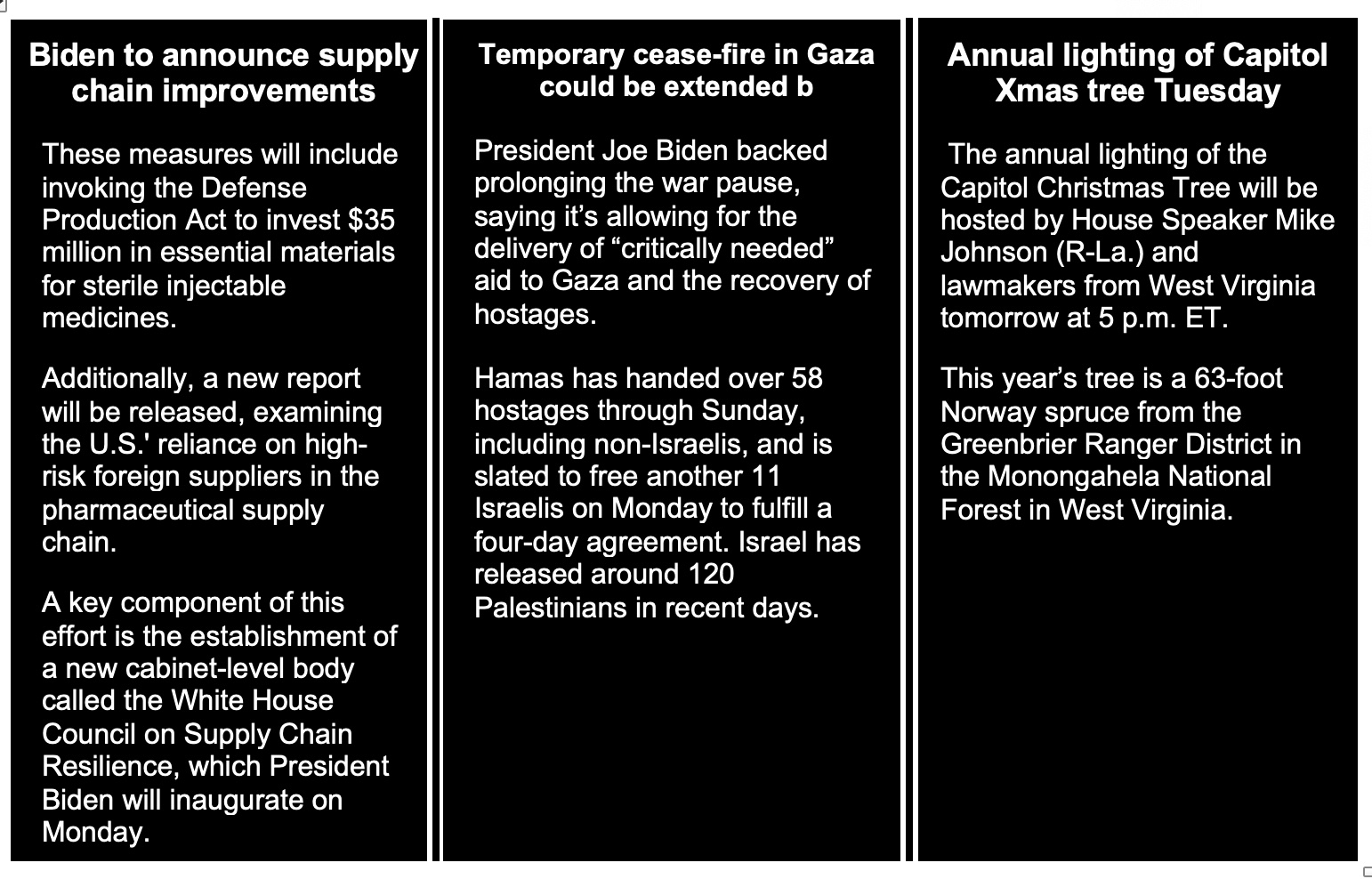
|
Today’s Digital Newspaper |
MARKET FOCUS
- White House will announce redoubling of measures for supply chains today
- Oil continues to decline as Israel-Hamas cease fire will likely be extended several days
- Gold reaches price over $2,000 per ounce, its highest level in more than six months
- Sales for retailers on Cyber Monday expected to be strong
- Key takeaways from Black Friday
- Credit card issuers face another potential hit to revenue
- What happens when you don’t listen to a central banker family member
- Amazon.com has now become the largest delivery business in U.S.
- Federal Reserve’s preferred measures will be published on Thursday
- Deutsche Bank forecasts the S&P 500 will end the next year with a 12% increase
- Ag markets today
- Ag trade update
- Severe thunderstorms in U.S. this year have caused unprecedented damage
- NWS weather outlook
- Pro Farmer First Thing Today items
CONGRESS
- Lawmakers focused on providing funding for Ukraine and Israel
- Congressional leaders face series of challenges before next holiday recess
ISRAEL/HAMAS CONFLICT
- Biden urges Israel PM Binyamin Netanyahu to extend four-day truce with Hamas
RUSSIA & UKRAINE
- Gazprom says gas exports to China reach new high as demand soars
- Currency clashes sour Russia's oil trade with Asia
CHINA
- Chinese industrial profit growth slowed to 2.7% in Oct vs. 11.9% in September
- China's progress on renewables undermined by coal expansion
- Chinese hog futures plunge to record-low
- China's swine fever epidemic leaves lasting global pork market impact
- Growing numbers of Chinese migrants cross U.S. southern border
- Alibaba founder Jack Ma starts ready-made food company
ENERGY & CLIMATE CHANGE
- In 2009, IEA underestimated renewable energy and EV growth
- Chinese EV success worldwide faces U.S. entry barriers
- President Biden will not attend COP28, the U.N. climate summit
- Battery prices declining, particularly for lithium-ion battery packs
LIVESTOCK, NUTRITION & FOOD INDUSTRY
- White House allocates funds to address methane emissions from Calif.'s dairy cows
- Federal jury finds egg producers guilty of price-fixing
HEALTH UPDATE
- WHO: China’s respiratory illness surge not as high as pre-pandemic
POLITICS & ELECTIONS
- More than 36 lawmakers not seeking re-election amid dysfunction in Congress
OTHER ITEMS OF NOTE
- Supreme Court set to hear oral arguments for SEC v. Jarkesy on Wednesday
|
MARKET FOCUS |
— Equities today: Asian and European markets were mostly weaker in overnight trading. U.S. Dow opened slightly lower than went slightly higher and then went lower again. In Asia, Japan -0.5%. Hong Kong -0.2%. China -0.3%. India closed. In Europe, at midday, London -0.2%. Paris -0.1%. Frankfurt -0.2%.
U.S. equities Friday: The Dow gained 117.12 points, 0.33%, at 35,390.15. The S&P 500 rose 2.72 points, 0.06%, at 4,559.34. The Nasdaq lost 15.0 points, -0.11%, at 14,250.85.
— $5.7 trillion: The amount of money that institutions and investors currently have parked in cash-like money-market funds, many of which are yielding above 5%, according to the Investment Company Institute. Some on Wall Street see the record amount of cash as a bullish signal and a potential tailwind for stocks and bonds if the inflation outlook continues to improve.
— Credit card issuers face another potential hit to revenue. The CFPB has proposed capping credit card late fees at $8, compared with $41 now, as part of the Biden administration’s efforts to eradicate junk fees. The CFPB estimates reducing late fees could save consumers $9 billion a year. Source: Barron’s.
— Agriculture markets Friday:
- Corn: December corn futures fell 5 1/2 cents to $4.63 1/4 in light trade, marking a 3 3/4 cent loss on the week.
- Soy complex: January soybean futures saw heavy selling for the second straight session, falling 25 3/4 cents to $13.30 3/4. That loss marked a 9 1/2 cent loss on the week, despite a rally to $13.89 1/4 mid-week. December soybean meal futures showed relative strength, though fell 70 cents to $457.4, marking a $4.1 gain on the week. December soyoil futures dropped 207 points to 51.53 cents, losing 48 points on the week.
- Wheat: December SRW wheat fell 7 cents to $5.48 3/4, losing 2 cents on the week. December HRW lost 12 1/2 cents to $6.02, marking a 16-cent loss on the week. December spring wheat dropped 14 cents to $6.96 3/4, losing 18 3/4 cents on the week.
- Cotton: December cotton futures saw relative strength despite the weak ag complex, currently trading around 50 points higher.
- Cattle: Live cattle futures saw heavy selling amid light volume, with nearby December futures falling $4.225 to $170.25, marking a $5.50 loss on the week. January feeder futures fell $7.80 to $219.325, marking a $9.175 loss in the shortened week.
- Hogs: December lean hogs fell 70 cents to $67.575, losing $3.40 on the week.
— Ag markets today: Corn, soybeans and wheat firmed amid mild corrective buying during overnight trade. As of 7:30 a.m. ET, corn futures were trading fractionally to a penny higher, soybeans were mostly 7 to 8 cents higher, SRW wheat was mostly 2 to 3 cents higher, HRW wheat was 4 to 5 cents higher and HRS wheat was 1 to 3 cents higher. Front-month crude oil futures were about $1.00 lower, and the U.S. dollar index was more than 125 points lower.
Cattle market searching for a low. Live cattle futures faced heavy liquidation pressure last Friday after disappointing cash cattle trade earlier in the week. Bears have a firm grip on futures price action and packers have the upper hand in the cash market coming out of Thanksgiving, despite tight supplies.
Cash hogs continue seasonal decline. The CME lean hog index is down another 30 cents to $73.60 (as of Nov. 22), extending its seasonal decline. The index is now $12.57 below last year at this time. December lean hog futures finished Friday $6.025 below today’s cash quote, suggesting traders anticipate persistent deterioration in cash prices into at least mid-December.
— Quotes of note:
- What happens when you don’t listen to a central banker family member. “He ignored me royally, which is his privilege. And he lost almost all the money that he had invested.” — Christine Lagarde, the president of the European Central Bank, on how her son lost big investing in cryptocurrencies despite her many warnings about the risks.
- One vote at a time. “We’re second place in Iowa, second place in New Hampshire, second place in South Carolina. I just got one more fella I got to catch up to.” — Nikki Haley, referring to Donald Trump's lead in polls.
- Customer is always right. “The customer today does not want an endless aisle. They want the best aisle.” — Tony Spring, Macy’s president and CEO-elect.
— Amazon.com has now become the largest delivery business in the United States, surpassing traditional giants like UPS and FedEx. A decade ago, Amazon was a significant customer for both UPS and FedEx, and many industry insiders doubted that it could ever overtake them. However, Amazon's substantial growth, along with changes in strategy by FedEx and UPS, have shifted the dynamics in the delivery industry, the Wall Street Journal reports (link). Amazon has delivered more than 4.8 billion packages in the U.S. this year, and its internal projections predict that it will deliver around 5.9 billion parcels, up from 5.2 billion last year. Overall parcel volume has dipped this year, as consumers diverted spending from goods to services. As Amazon’s share has increased, FedEx and UPS have said they are focused on delivering more profitable parcels.
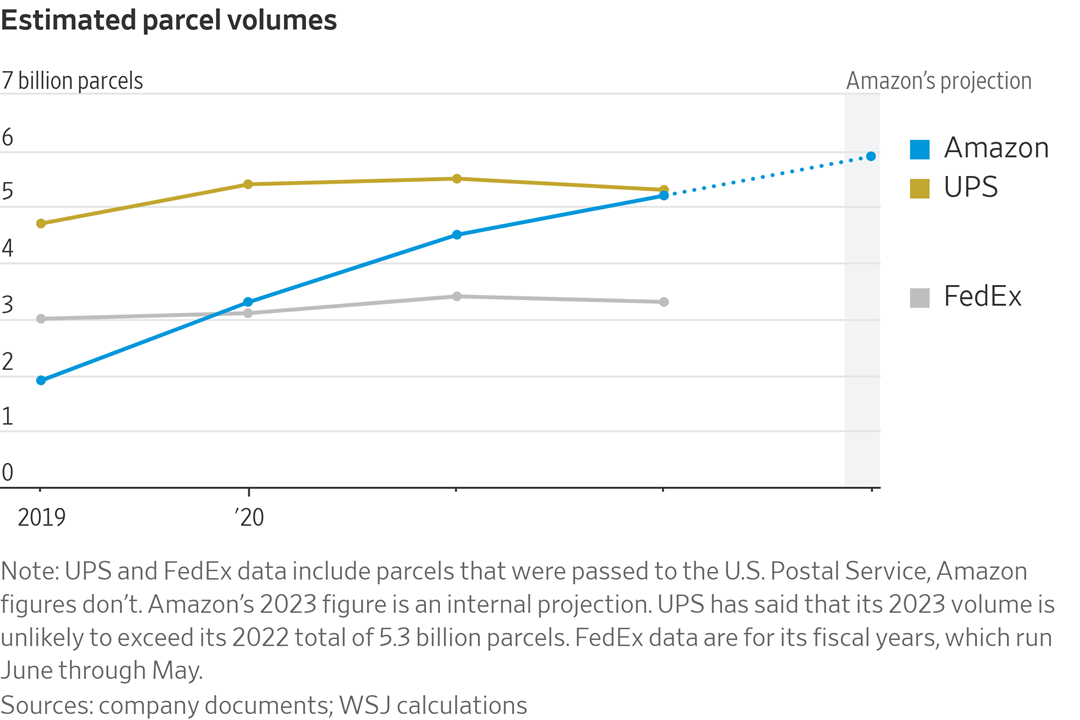
— Here are key takeaways from Black Friday:
- U.S. consumer spending remains strong, with Black Friday sales increasing by 2.5% compared to the previous year, according to Mastercard SpendingPulse.
- Retail foot traffic saw a 2.1% rise, but questions remain about whether this can revive struggling shopping malls and the commercial real estate sector.
- Online shopping was the standout winner, with e-commerce sales surging by 7.5% to reach $9.8 billion, as reported by Adobe Analytics.
Black Friday showed notable changes from previous years:
- Amazon aimed to expand further by exclusively airing the NFL's first-ever Black Friday game on its Prime streaming service, part of its $100 million "Thursday Night Football" broadcast deal. The broadcast included QR codes to promote deals.
- Retailers began offering deals earlier than usual, reflecting concerns that shoppers might not turn up on Black Friday itself. Retailers like Macy's adapted to the changing competitive landscape by offering Black Friday deals ahead of the traditional shopping day.
Bottom line: These shifts highlight the evolving dynamics of Black Friday and the growing significance of online shopping.
— Federal Reserve’s preferred measures will be published on Thursday, with the personal consumption expenditures price index seen rising 3.1% in October from a year ago. The core measure, which excludes food and fuel and is considered a better gauge of underlying inflation, is expected to have climbed 3.5%.
Of note: Speeches by Fed officials Austan Goolsbee, Michelle Bowman, and Loretta Mester on Tuesday and Wednesday will also be helpful for understanding how the central bank is viewing the economy. Chairman Jerome Powell speaks on Friday.
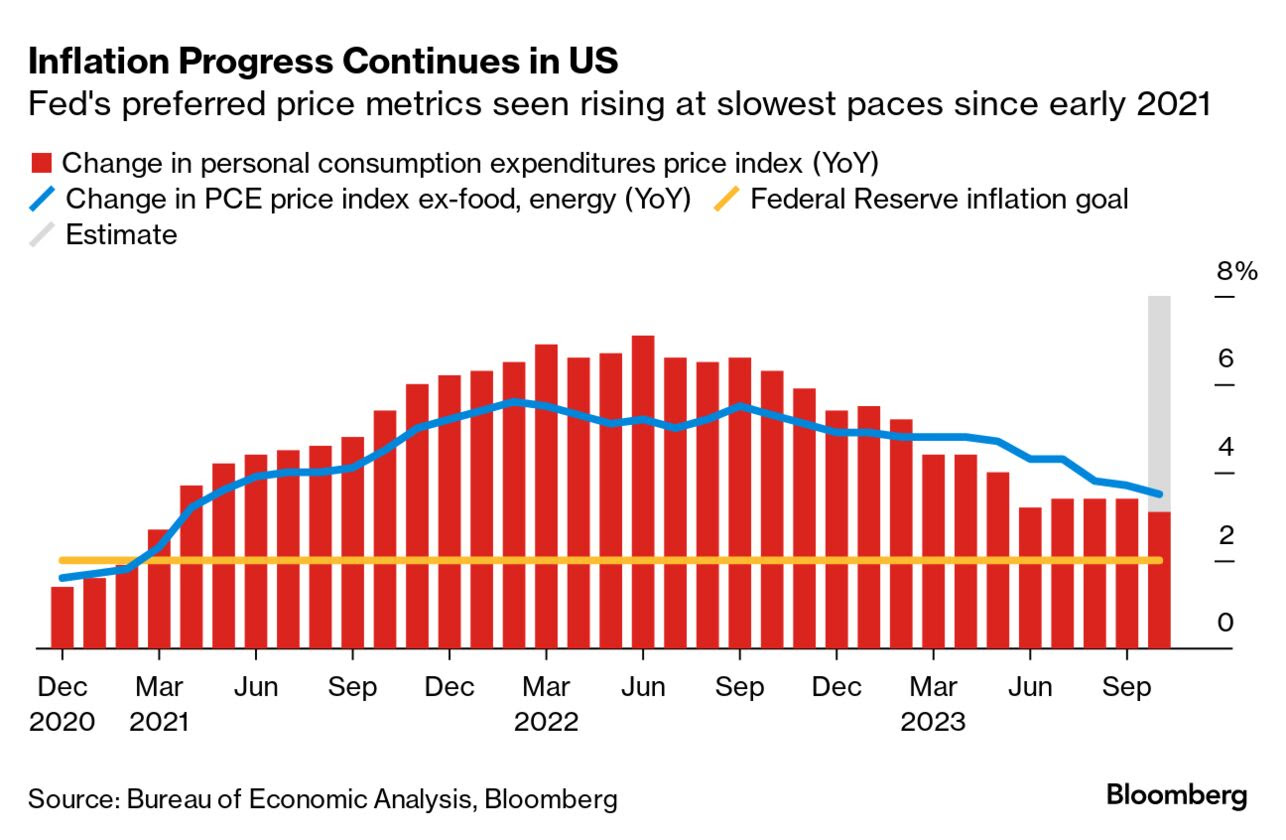
— Deutsche Bank forecasts the S&P 500 will end the next year with a 12% increase, with the expectation that corporate earnings will remain strong even in the event of a mild and short-lived U.S. recession. Key points from their forecast:
- S&P 500 target: Deutsche Bank analysts project that the S&P 500 will reach 5,100 points by the end of 2024. This target reflects an expected 12% increase in the index. The S&P 500 has already seen nearly a 19% rise so far this year.
- Earnings growth: The bank anticipates a 10% rise in earnings for companies within the S&P 500, factoring in the possibility of a brief recession. If U.S. GDP grows by 2%, they expect a more substantial 19% increase in earnings.
- Favorable valuation: Deutsche Bank believes that if earnings continue to recover as expected, valuations for stocks will remain well-supported, potentially staying at the top end of the range.
- Inflation and Fed policy: A decline in core inflation to pre-pandemic levels without a slowdown in economic growth could support the S&P 500. This scenario suggests that the Federal Reserve would not cut interest rates unless a recession occurs.
- Economic outlook: The bank anticipates a "mild" U.S. recession in the first half of the next year, prompting the Fed to reduce policy rates by 175 basis points. They forecast the economy to grow by only 0.6% in the upcoming year.
Bottom line: Deutsche Bank's forecast is more optimistic than the median forecast of 4,700 points from 33 strategists polled by Reuters. They attribute their positive outlook to the expectation of resilient corporate earnings and supportive factors in the market, even amid economic challenges.
Market perspectives:
— Outside markets: The U.S. dollar index fell, with the euro and British pound stronger against the greenback. The yield on the 10-year U.S. Treasury note was lower, trading around 4.45%, with a mostly lower tone in global government bond yields. Crude oil futures were lower, with U.S. crude around $75.20 per barrel and Brent around $80.15 per barrel after having dipped below $80 previously. Gold and silver were higher ahead of U.S. market action, with gold around $2,014 per troy ounce and silver around $24.78 per troy ounce.
— Gold reaches price over $2,000 per ounce, its highest level in more than six months. This increase has contributed to a 1.5% gain for the month of November. The rise in the price of gold is attributed to a weakening U.S. dollar and the belief that interest rates in the U.S. may have reached their peak.
— Brent crude futures dropped below $80 per barrel on Monday, continuing a recent decline. Investors are anticipating the OPEC+ meeting scheduled for later in the week, with uncertainty about whether the group would decide to further reduce oil output in 2024. The postponement of the ministerial meeting to Nov. 30 by OPEC+ due to a dispute over output quotas for African producers added pressure on oil prices last week. Additionally, there have been indications of ample oil supplies, especially from non-OPEC countries. U.S. crude inventories have been increasing more than expected, contributing to the downward pressure on crude prices. The International Energy Agency (IEA) mentioned that it still anticipates a slight surplus in global oil markets next year, even if OPEC+ extends supply cuts well into 2024. This suggests that despite efforts to manage output, there may still be an oversupply of oil in the market.
— In 2009, IEA underestimated renewable energy and EV growth. In 2009, the International Energy Agency (IEA) predicted that solar power would remain too costly to effectively compete on the grid. However, the IEA's predictions have consistently underestimated the growth of renewable energy sources and electric vehicles (EVs). This growth has been propelled by declining costs and advancements in technology. Notably, in the past year, over four-fifths of the world's new power capacity came from renewable energy sources, as reported by the International Renewable Energy Agency (IREA).
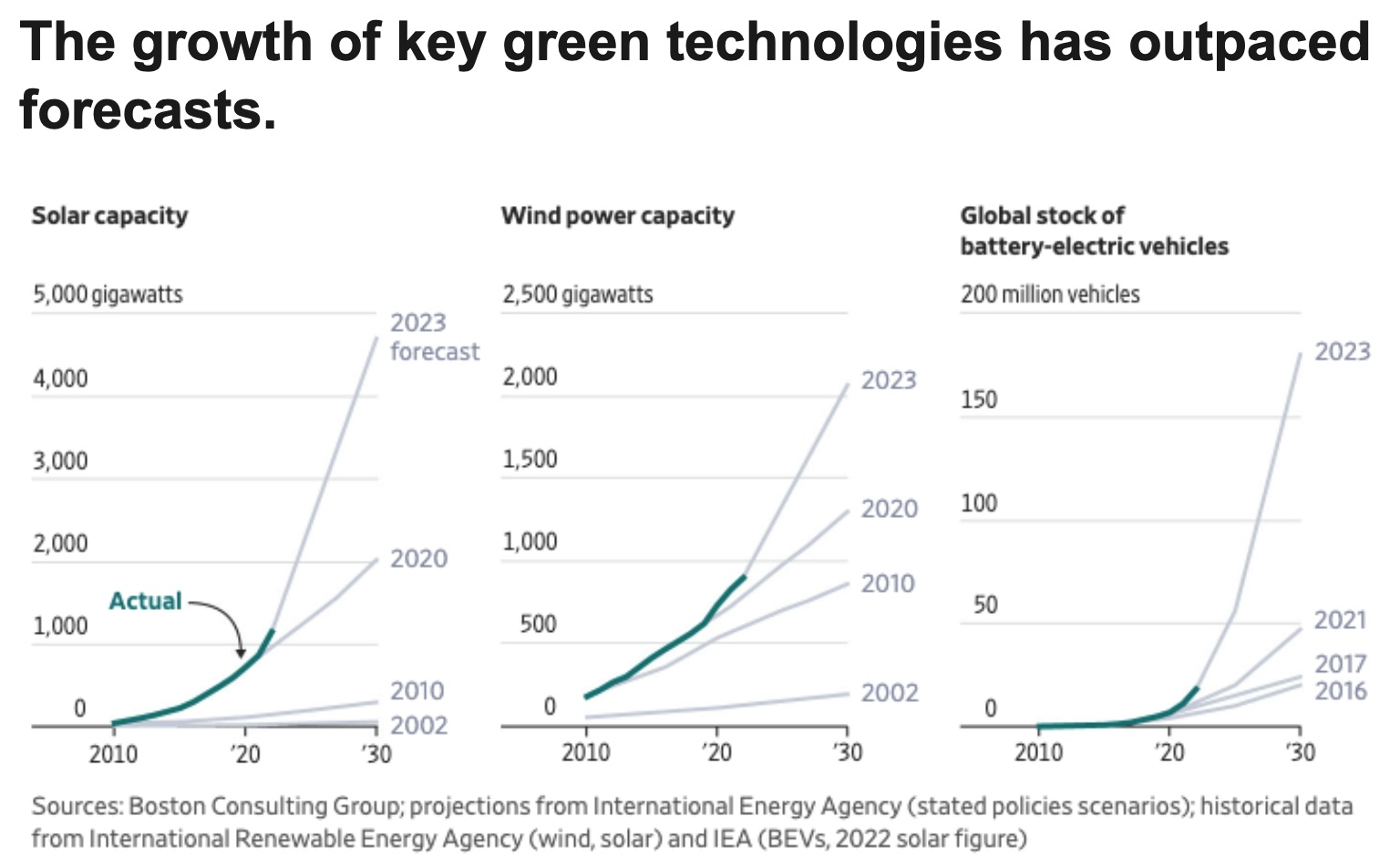
— Ag trade update: Pakistan tendered to buy 110,000 MT of optional origin wheat. Bangladesh tendered to buy 50,000 MT of optional origin milling wheat.
— Severe thunderstorms in the U.S. this year have caused unprecedented damage, resembling the levels typically associated with hurricanes, creating challenges for businesses and insurers, according to Risk & Compliance Journal’s Richard Vanderford (link):
- Record-setting damage: Severe convective storms have resulted in over $55.67 billion in insured damage in the U.S. through November 13, exceeding the previous record of $50 billion.
- Strategies for coping: Businesses are adopting various strategies to deal with the onslaught of severe weather, including hiring meteorologists to closely monitor weather conditions.
- Impact on insurance: The increased frequency of severe weather events is affecting insurance markets. Businesses seeking coverage are facing challenges as insurance carriers are taking measures to protect themselves from losses.
- Rising insurance costs: Risk managers from various industries are grappling with the fact that insurance has become more expensive. This situation is putting pressure on boards to absorb the higher insurance costs.
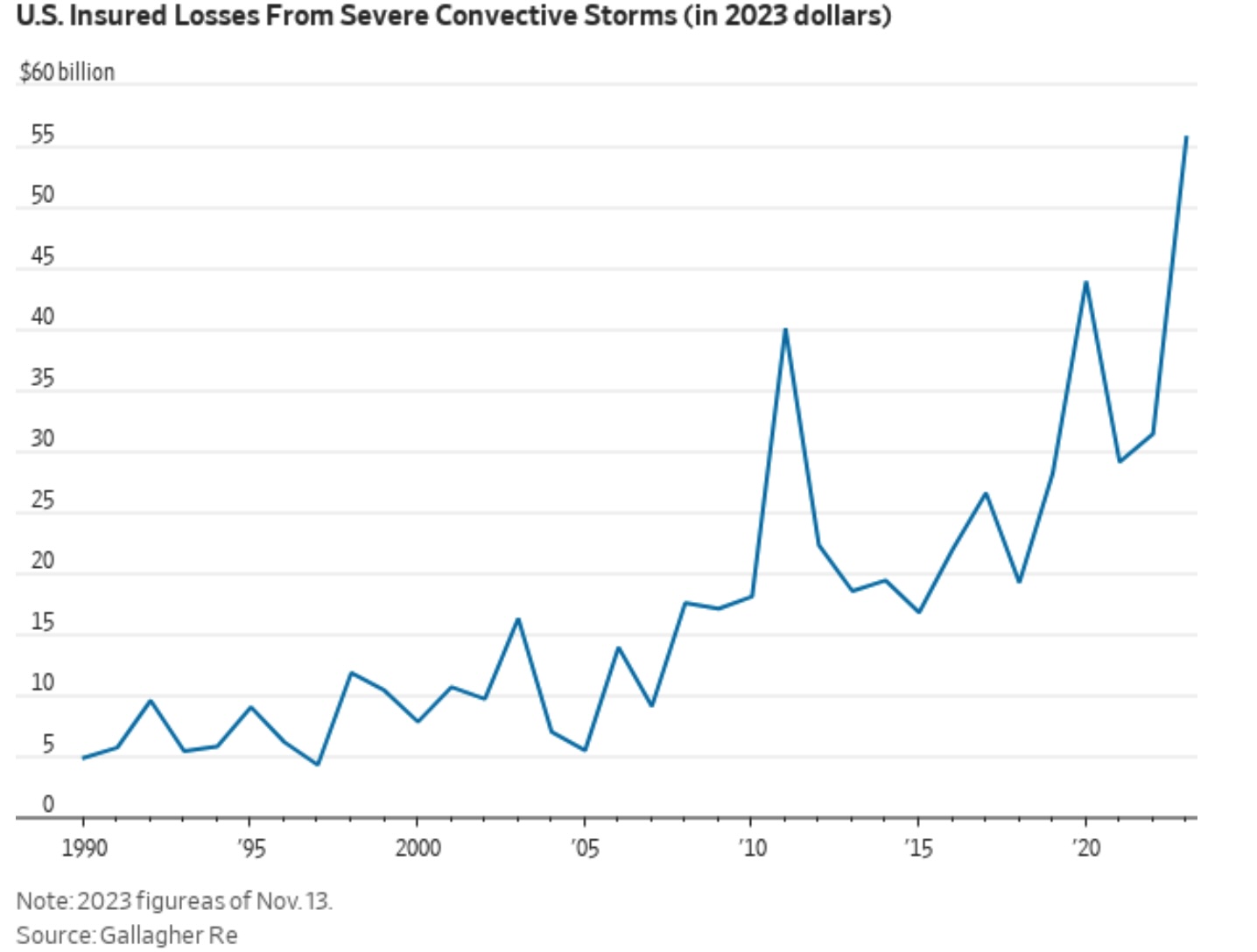
— NWS weather outlook: Heavy lake-effect snowfall downwind of the Great Lakes early this week... ...Below average temperatures continue for much of the country for at least the next few days.
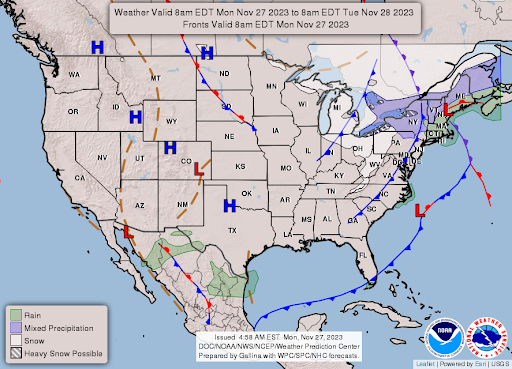
Items in Pro Farmer's First Thing Today include:
• Modest corrective buying in grains overnight
• Rains forecast for Brazil but more needed
• Brazil soybean planting still delayed
|
CONGRESS |
— Lawmakers are focused on providing funding for Ukraine and Israel, with plans to introduce a national security supplemental bill as early as next week, according to Senate Majority Leader Chuck Schumer (D-N.Y.). However, there are challenges and differing priorities within Congress.
In the Senate, some Republicans are pushing to include border-related provisions favored by conservatives but unpopular with Democrats as part of any further aid for Ukraine. Meanwhile, opposition to such aid is growing among House Republicans.
The funding for Israel is currently in a state of uncertainty, as Senate Democrats oppose a House-passed measure that links the aid to cuts in IRS funding.
House Speaker Mike Johnson (R-La.) could potentially secure bipartisan support for aid to both Ukraine and Israel, but he risks alienating the right-wing faction of his party that previously blocked progress on a Commerce-Justice-Sciences spending bill to protest stopgap funding before the recent recess.
But House Intelligence Committee Chair Mike Turner told NBC’s Meet the Press that aid for Ukraine and Israel will be difficult to pass while Congress is divided over changes to border security. Turner said, “Congress is going to require that there’ll be laws changed to make certain that the border returns to its prior state. ... I think it would be very difficult to get it done by the end of the year and the impediment, currently, is the White House policy on the southern border.”
Rep. Ro Khanna (D-Calif.) told ABC’s This Week that he supports aid for Israel’s Iron Dome missile defense system and defensive equipment, but said the U.S. needs to enforce the Leahy Law that said U.S. aid needs to be consistent with international human rights law.
Bottom line: Schumer said Sunday he expects to bring Biden’s request for Israel and Ukraine aid, plus other national security priorities, to a floor vote as soon as the week of Dec. 4. Negotiations between Republicans and Democrats continued through the Thanksgiving break.
— Congressional leaders face a series of challenges before the next holiday recess. Lawmakers are scheduled to leave town on Dec. 14, but the to-do list could keep them in Washington the week before Christmas. The list includes:
- Fiscal year (FY) 2024 spending: The Senate has passed three of the 12 appropriations bills, and the House has passed seven. Lawmakers from both parties are anticipating a heated battle among Republicans over federal spending. House Speaker Mike Johnson (R-La.) is facing the challenging task of balancing the demands of House conservatives for fiscal reform with the need to keep the gov’t operating. Although Johnson managed to avert a government shutdown earlier in the month without major consequences, members of the House Freedom Caucus are indicating that they won't give him another pass. Rebel Rep. Chip Roy (R-Texas) has criticized Johnson for making concessions to Democrats to pass funding stopgaps until January 19 and Feb. 2, referring to them as "strike one" and "strike two." This puts Johnson at risk of facing a similar fate to his predecessor, Rep. Kevin McCarthy (R-Calif.), who lost the House Speaker position in October due to his negotiations with Democrats that were seen as unfavorable by some Republicans. Johnson's ability to influence outcomes is limited, given Democratic control of the White House and Senate, making it a challenging situation for him as Speaker.
- Section 702 of the Foreign Intelligence Surveillance Act: There is disagreement among lawmakers on how to reauthorize Section 702, particularly regarding the provision that allows surveillance of U.S. citizens with connections to foreign individuals.
- National Defense Authorization Act (NDAA): Negotiations over the NDAA, which typically receives broad support, could be stalled due to Democratic opposition to an abortion provision in the House version. Senator Schumer plans to seek a vote on a resolution that would enable the Senate to process military promotions in groups to circumvent Senator Tommy Tuberville's protest against the Pentagon's abortion policy.
- Expected Vote on Expelling Rep. George Santos (R-N.Y.): Following the release of an ethics report containing accusations of theft and other crimes, there is an expected vote on whether to expel Rep. George Santos. Members from both parties who previously opposed expulsion are now considering removing the freshman lawmaker, although there is some disagreement on whether a committee-led investigation provides enough evidence.
- Impact on Legislative Math: If Santos is expelled, Speaker Mike Johnson (R-La.) could face even greater challenges in getting bills passed with only Republican support. After a special election in Utah, Republicans hold 222 seats, and Democrats hold 213.
|
ISRAEL/HAMAS CONFLICT |
— Biden urges Israel PM Binyamin Netanyahu to extend a four-day truce with Hamas, which is due to end on Tuesday, to allow for the release of more hostages. A Hamas spokesman called on President Biden to press Israel to end its offensive. Hamas said it would agree to lengthen the truce if Israel increased the number of Palestinian captives it released. On Sunday Hamas handed over more hostages and Israel released a third batch of 39 Palestinian prisoners. The pause in fighting has allowed supplies of food, fuel and medicine to enter Gaza.
|
RUSSIA/UKRAINE |
— Gazprom says gas exports to China reach new high as demand soars. Russia’s Gazprom PJSC said its natural gas deliveries to China have hit a new historic high amid rising demand. Link to Bloomberg for details.
— Currency clashes sour Russia's oil trade with Asia. As a temporary solution to the clash involving Indian deals, the cargoes were paid for in a combination of the Chinese yuan, the Hong-Kong dollar as a transition currency into the yuan and the UAE dirham. Link for more via Reuters.
|
CHINA UPDATE |
— In October, China's industrial profits increased by 2.7% compared to the same month in the previous year. This marks the third consecutive month of growth but represents a significant slowdown from the 11.9% growth seen in September. These numbers indicate that China's economic recovery is fragile. When looking at profits for the first ten months of 2023, they were down by 7.8% compared to the same period in the previous year, reflecting ongoing challenges in the industrial sector.
— China’s progress on renewables undermined by coal expansion. Rapid growth in China’s renewable energy sector to meet climate goals is being undermined by continued coal capacity expansion and a fast rise in energy consumption, a report said. China’s energy bureau said last week total installed solar power capacity hit 536 gigawatts (GW) in October, up 47% from a year earlier, with wind capacity also rising 15.6%. If this year’s rate of renewables expansion is maintained, China is on track to bring emissions to a peak and start reducing them in coming years, the Centre for Research on Energy and Clean Air (CREA) and the Heinrich Böll Foundation (HBF) said in their annual progress report on China’s climate actions. However, the country must redouble efforts on energy efficiency and transform its growth model to tackle rising energy consumption, which is still running ahead of “1.5-degree scenarios,” the report said.
— Chinese hog futures plunge to record-low. China’s most active hog futures closed down 5.69% on Monday at a record low, after farmers ramped up selling of pigs following months of weak prices. Farmers accelerated herd liquidation in recent weeks, as cash hog prices dropped another 4% last week. January hog futures have plunged more than 9% so far this month.
— China's swine fever epidemic leaves lasting global pork market impact. China, the world's top producer and consumer of pork, faced a significant outbreak of African swine fever among its pig herds that lasted for three years until late 2021. Despite its recovery, the domestic pork market in China remains volatile, posing potential uncertainties for pork exporters worldwide. The epidemic had lasting impacts on the global pork market, as outlined in a report (link) by three USDA economists:
- Pork output impact: During the 30 months of the epidemic, China's pork production dropped by an average of 18% below normal levels.
- Consumer price surge: Pork prices for consumers doubled for 14 months, ending in January 2021, and only returned to pre-epidemic levels by September 2021.
- Limited imports: Although record amounts of pork were imported during the outbreak, they could only replace a fraction of the lost production.
- Hog farming consolidation: The epidemic led to the consolidation of hog farming into larger-scale operations.
- Higher production costs: China incurred higher production costs due to the construction of new, larger hog farms and stricter biosecurity practices.
- Sustained demand for imported pork: Rising pork prices in China, reflecting increased production costs, may continue to support the demand for imported pork, despite China's expansion of pork production capacity.
- Global pork market: China remained the world's largest pork importer in 2022, though its share of the global market was less than one-third of its peak during the epidemic.
Bottom line: The recovery and ongoing dynamics in China's pork industry have implications for both domestic and international markets, highlighting the complexities of the global pork trade.
— Growing numbers of Chinese migrants cross U.S. southern border. More than 24,000 Chinese citizens have been apprehended crossing into the United States from Mexico in the past year. That is more than in the preceding 10 years combined. Link to details via the NYT.
— Alibaba founder Jack Ma starts ready-made food company. New Chinese business comes amid Ma's reported interest in agriculture tech. Link for more via Nikkei Asia.
|
ENERGY & CLIMATE CHANGE |
— Chinese EV success worldwide faces U.S. entry barriers. Chinese automakers have been successful in selling affordable electric vehicles (EVs) in many global markets, but they have faced significant barriers entering the U.S. market. U.S. government policies and trade barriers have effectively prevented Chinese EVs from entering the American market, the Wall Street Journal reports (link). However, some U.S. officials believe that even these barriers might not be sufficient in the future to keep Chinese EVs out of the American market and protect domestic manufacturers. The situation highlights the challenges and complexities of the global EV market and the competitive landscape.
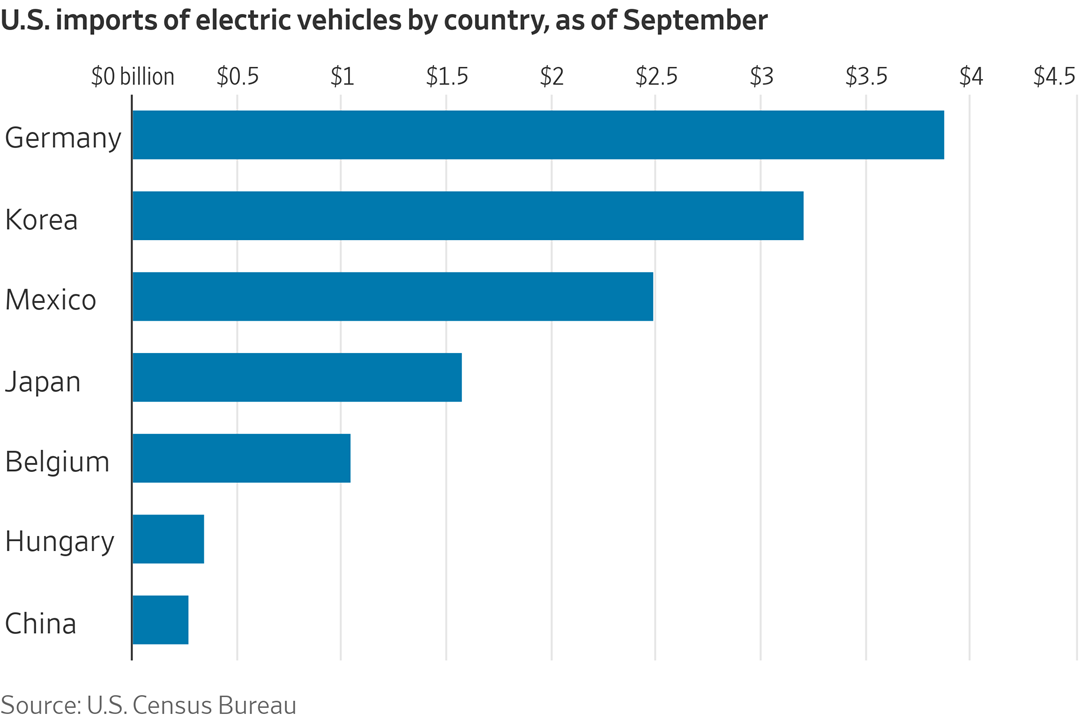
— President Biden will not attend COP28, the U.N. climate summit scheduled to start in Dubai on Thursday. While no specific reason was provided, White House aides suggested that his involvement in addressing issues related to the Israel-Hamas conflict and Ukraine might be factors influencing this decision.
— Battery prices, particularly for lithium-ion battery packs, are again following their historical downward trend after experiencing an unusual increase last year:
- Price decline: Average lithium-ion battery pack prices in 2023 have dropped to $139 per kilowatt-hour, marking a 14% decrease compared to the previous year, as reported by BloombergNEF.
- Raw material costs: The decrease in battery prices is partly attributable to a drop in raw material prices. This reduction is the result of substantial growth in production capacity throughout the battery supply chain.
- Demand vs. expectations: Despite ongoing growth in demand for batteries, it has fallen short of industry expectations. This dynamic indicates that the battery market is evolving in response to various factors, including pricing and production capacity.
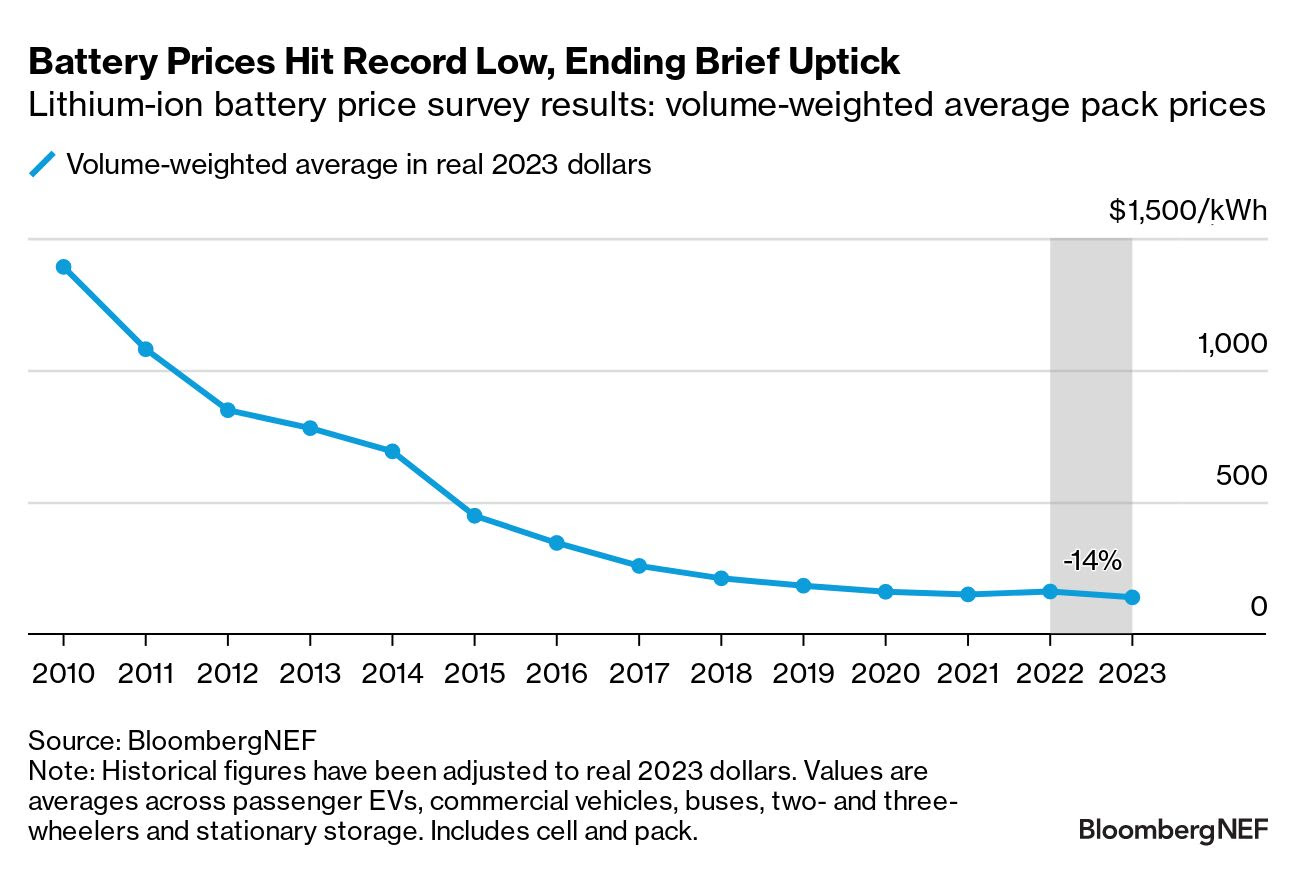
|
LIVESTOCK, NUTRITION & FOOD INDUSTRY |
— White House has allocated millions of dollars to address methane emissions from California's dairy cows. Two grants from the Biden administration totaling $44.2 million have been awarded, with $21.4 million going to California Dairies and $22.8 million to the Dairy Farmers of America (DFA). These funds are intended for the development of feed additives aimed at reducing methane emissions produced by cow belches. Additionally, carbon credits are being offered to incentivize farmers to adopt climate-focused changes. Link for details. California has set a target to reduce methane emissions in the dairy industry by 40% from 2013 levels by 2030. Dairy cooperatives in California have been collaborating with state and federal authorities on various projects to reduce emissions through manure and methane capture.
— Federal jury finds egg producers guilty of price-fixing. In a long-standing legal case, a federal jury in Chicago has issued a verdict finding that several major egg producers engaged in a conspiracy to manipulate the U.S. egg supply and increase prices during the period from 2004 to 2008. Link to more via the Associated Press.
|
HEALTH UPDATE |
— WHO: China’s respiratory illness surge not as high as pre-pandemic. The spike in respiratory illnesses that China is currently suffering is not as high as before the Covid-19 pandemic, a World Health Organization (WHO) official said, reiterating that no new or unusual pathogens had been found in the recent cases. Maria Van Kerkhove, acting director of the WHO’s department of epidemic and pandemic preparedness and prevention, said the increase appeared to be driven by a rise in the number of children contracting pathogens they had avoided during two years of Covid restrictions. China’s National Health Commission spokesperson Mi Feng said on Sunday the surge in acute respiratory illnesses was linked to the simultaneous circulation of several kinds of pathogens, most prominently influenza. The spike became a global focus last week when WHO asked China for more information, citing a report on clusters of undiagnosed pneumonia in children by the Program for Monitoring Emerging Diseases.
|
POLITICS & ELECTIONS |
— More than 36 lawmakers not seeking re-election amid dysfunction in Congress. The New York Times reports (link) that more than 36 members of Congress “have announced they will not seek re-election next year, some to pursue other offices and many others simply to get out of Washington. ... The wave of lawmakers across chambers and parties announcing they intend to leave Congress comes at a time of breathtaking dysfunction on Capitol Hill, primarily instigated by House Republicans.” Lawmakers “are weighing the personal sacrifice required to be away from loved ones for much of the year against the potential to legislate and advance their political and policy agendas. In this chaotic and bitter environment, many are deciding the trade-off is unappealing.” The NYT says that “while most of the departures announced so far do not involve competitive seats, given the slim margins of control in both chambers, the handful that provide pickup opportunities for Republicans or Democrats could help determine who controls Congress come 2025.”
|
OTHER ITEMS OF NOTE |
— Supreme Court set to hear oral arguments for SEC v. Jarkesy on Wednesday. The case revolves around the constitutionality of the Securities and Exchange Commission's (SEC) primary enforcement tool for combating securities fraud, which is administrative enforcement proceedings. This case represents the latest in a series of legal challenges aimed at the regulatory authority of the federal agency. Additionally, it is one of several cases originating from the conservative U.S. Court of Appeals for the 5th Circuit that the Supreme Court is scheduled to review in the current term. The outcome of this case could have significant implications for the SEC's ability to use administrative enforcement proceedings in its efforts to combat securities fraud.
|
KEY LINKS |
WASDE | Crop Production | USDA weekly reports | Crop Progress | Food prices | Farm income | Export Sales weekly | ERP dashboard | California phase-out of gas-powered vehicles | RFS | IRA: Biofuels | IRA: Ag | Student loan forgiveness | Russia/Ukraine war, lessons learned | Russia/Ukraine war timeline | Election predictions: Split-ticket | Congress to-do list | SCOTUS on WOTUS | SCOTUS on Prop 12 pork | New farm bill primer | China outlook | Omnibus spending package | Gov’t payments to farmers by program | Farmer working capital | USDA ag outlook forum | Debt-limit/budget package |






